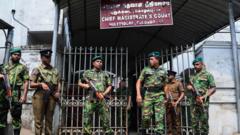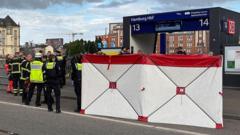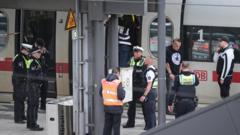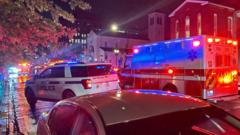In a shocking incident that has sent ripples of fear through Sri Lanka, a gang leader was fatally shot inside a courthouse in Colombo, reinforcing concerns around the escalating gang violence in the region.
Caught in a Crossfire: Courtroom Assassination Shocks Sri Lanka

Caught in a Crossfire: Courtroom Assassination Shocks Sri Lanka
A gang leader is shot dead in a Sri Lankan courthouse, raising alarms over judicial security and gang violence.
On Wednesday, Sanjeewa Kumara Samararathne, widely known as Ganemulle Sanjeewa, was gunned down by an assailant disguised as a lawyer while facing multiple murder charges. Authorities report that the weapon used—a revolver—was ingeniously smuggled into the courthouse within a hollowed-out book, a method orchestrated by a female accomplice who remains at large.
Samararathne had been under police escort when he was shot and later succumbed to his injuries at the hospital, despite the presence of a dozen officers assigned to ensure his safety. The gunman, identified by various names by authorities and media, managed to evade capture immediately after the shooting but has since been apprehended. The female suspect, Pinpura Dewage Ishara Sewwandi, aged 25, is the target of an ongoing manhunt, with police offering a reward for information leading to her arrest.
In response to this alarming event, which highlights the ongoing battle between rival gangs in Sri Lanka, lawmakers have begun discussions on enhancing security measures in courtrooms. Mass Media and Health Minister Nalinda Jayatissa reiterated the government's commitment to addressing organized crime, labeling gang violence a serious public concern.
Following the assassination, justice minister Harshana Nanayakkara announced immediate re-evaluations of courthouse security protocols, including the potential deployment of armed guards for high-risk cases—an unprecedented move in Sri Lanka's judicial environment, where such security measures are not typically implemented.
As the country grapples with this high-profile murder, statistics indicate that this year alone has seen at least nine fatalities linked to ongoing gang rivalries, prompting calls for a decisive stance against such criminal undertakings. The tragic event illustrates the precarious intersection of crime, justice, and security in a nation striving to suppress its underworld factions.
Samararathne had been under police escort when he was shot and later succumbed to his injuries at the hospital, despite the presence of a dozen officers assigned to ensure his safety. The gunman, identified by various names by authorities and media, managed to evade capture immediately after the shooting but has since been apprehended. The female suspect, Pinpura Dewage Ishara Sewwandi, aged 25, is the target of an ongoing manhunt, with police offering a reward for information leading to her arrest.
In response to this alarming event, which highlights the ongoing battle between rival gangs in Sri Lanka, lawmakers have begun discussions on enhancing security measures in courtrooms. Mass Media and Health Minister Nalinda Jayatissa reiterated the government's commitment to addressing organized crime, labeling gang violence a serious public concern.
Following the assassination, justice minister Harshana Nanayakkara announced immediate re-evaluations of courthouse security protocols, including the potential deployment of armed guards for high-risk cases—an unprecedented move in Sri Lanka's judicial environment, where such security measures are not typically implemented.
As the country grapples with this high-profile murder, statistics indicate that this year alone has seen at least nine fatalities linked to ongoing gang rivalries, prompting calls for a decisive stance against such criminal undertakings. The tragic event illustrates the precarious intersection of crime, justice, and security in a nation striving to suppress its underworld factions.






















